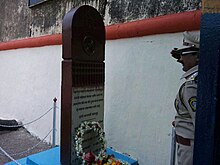Raghoji Bhangare
Indian Freedom Fighter Naik Raghojirao Ramjirao Bhangre Patil of Devgaon | |
|---|---|
| नाईक राघोजीराव रामजीराव भांगरे | |
 | |
| Born | Raghoji 8 November 1805 |
| Died | 2 May 1848 |
| Cause of death | Hanged |
| Nationality | Indian |
| Other names | Raghuji, Raghojee |
| Occupation | Patil of Devgaon |
| Era | British era |
| Organization | Bandkari |
| Title | Indian Freedom Activist
Patil of Devgaon Chief of Kolis of Bhangre clan |
| Predecessor | |
| Movement | Indian independence movement |
| Parent(s) |
|
| Family | Manaji Bhangare (Grandfather), (Brother) |

Raghojirao Ramjirao Bhangre also spell Bhangaria (8 November 1805 – 2 May 1848) was an Indian revolutionary who challenged and defied the British power in Maharashtra. He was the son of , a Koli who also resisted the British rule and was subsequently hanged in Cellular Jail.[1][2][3][4] he was only ten years old when he took up arms against British rule in Maharashtra.[5]
Early life[]
Raghoji Rao was born in 1805 to Ramji Rao Bhangre in Deogaon of Akole in Western Ghat of Maharashtra in British India. His family members were Mahadev Koli and were active in Indian independence movement. His father Ramji Bhangre also served in the British Police but latter gave up the job and revolted against British government.
Revolutionary activities[]
In 1818, the Maratha Empire was defeated by British in the Battle of Koregaon. After that the tribals of Maharashtra took to slavery and Raghoji Rao raised against British rule in the minor age. He captured the British treasure and he was declared as an Outlaw. After that he resisted the government in Poona. In 1844, Raghoji Rao with his brother Bapuji Bhangre cut off the nose of an officer. After that the Captain Giberne seized a party of rebels. At 20 September 1844, Raghuji killed an officer and ten constables in the hills. In 1845, his rebellion spread over Pune, Satara and Purandar. A reward of five thousands rupees was announced for the capture of Raghoji.
Death[]
On 2 January 1848, Bangre was caught by Lieutenant-General Gell and hanged.[6][7]
Tribute[]

In 2014, The Chief minister of Maharashtra, Prithviraj Chavan inaugurated a Circuit House in Thane named after Raghoji.[8]
See also[]
References[]
- ^ ढोमणे, सौ शिल्पा (2016-04-21). Veer Raghoji Bhangre / Nachiket Prakashan: वीर राघोजी भांगरे (in Marathi). Nachiket Prakashan.
- ^ "Adivasis celebrate and demand of basic amenities on 'World Indigenous Day'". Mumbai Live. Retrieved 2019-04-07.
- ^ "राघोजी भांगरे यांचा लढा भावी पिढीला प्रेरणादायी". Maharashtra Times (in Marathi). 2014-05-04. Retrieved 2019-04-07.
- ^ Guha, Sumit (2006-11-02). Environment and Ethnicity in India, 1200-1991. Cambridge University Press. ISBN 9780521028707.
- ^ Hardiman, David; Hardiman, Professor of History David (1996). Feeding the Baniya: Peasants and Usurers in Western India. New Delhi, India: Oxford University Press. p. 226. ISBN 978-0-19-563956-8.CS1 maint: date and year (link)
- ^ Keer, Dhananjay (1997). Mahatma Jotirao Phooley: Father of the Indian Social Revolution. Popular Prakashan. ISBN 9788171540662.
- ^ Kennedy, Michael (1985). The Criminal Classes in India. Mittal Publications.
- ^ "Uddhav distances himself from Saamana edit against Gujaratis". The Indian Express. 2014-05-03. Retrieved 2019-04-07.
Further reading[]
- Krishan, Shri (2005-04-07). Political Mobilization and Identity in Western India, 1934-47. New Delhi: SAGE Publishing India. ISBN 9789352803071.
- Revolutionaries of the Indian Rebellion of 1857
- Koli people
- Indian rebels
- 1805 births
- 1848 deaths